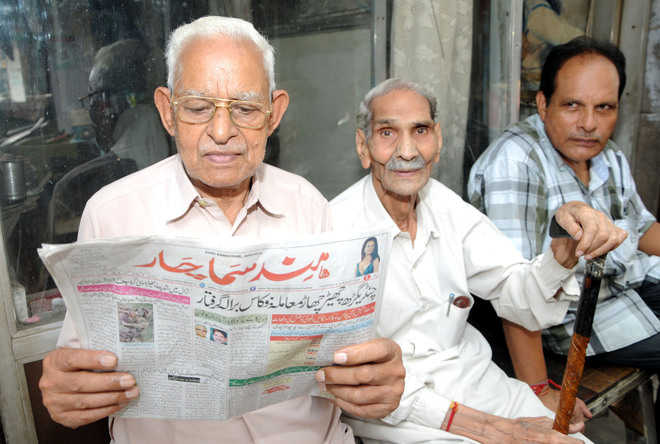
Ishar Das (left) and Krishan Lal Mahajan (centre) at a barber shop at Katra Bagian in Amritsar on Thursday. Photo: Vishal Kumar
Charanjit Singh Teja
Tribune News Service
Amritsar, August 10
They were classmates in 1930s. Hailing from well-off families, they studied, played and enjoyed together in Zafarwal tehsil of Narowal district, now in Pakistan, but the Partition in 1947 left them tormented as the families of both had to flee the then newly-formed State — Pakistan, leaving behind their properties and business. Now, well settled in Amritsar, Krishan Lal Mahajan and Ishar Das sit together and discuss their childhood days.
Krishan Lal Mahajan is now 87. He says he visits in his dreams his native village — Bara Pind Jagpal — in Pakistan. “Those memories are still vivid. I remember all streets, fields and shops of Bara Pind Jagpal a village in Zafarwal tehsil of Narowal district (then in Gurdasur) even after 70 years,” he says. But, he has never made any effort to visit his native place.
His friend Ishar Das (85) of Gandot village of the same tehsil has visited his village twice after the Partition, in 1965 and 1971 after wars between India and Pakistan as the area the Indian Army had occupied included his village as well. Ishar Das says he has made several attempts to visit Lahore but succeeded once.
Mahajan and Das, who were class-fellows in their childhood, had left their school when they were in sixth standard. After 70 years of Partition, they often sit on a bench outside a barber shop at Katra Bagian and talk for hours about their childhood, the Partition, politics and the struggles they have faced.
They hold a grudge against politicians who were responsible for the Partition of India as that dreadful event in 1947 left their families moneyless, who were moneylenders. For survival, they had to do petty jobs and low profile trades.
“In 1946, I had shifted to Lahore and got recruited in the Indian Railways as an operator. My father was a diesel pump operator. We had a good life and our future was bright but the Partition took away everything. I sold watermelons on roadsides for survival,” says Krishan Lal Mahajan.
Mahajan says he doesn’t have a sound knowledge about the politics and freedom struggle. “I used to listen a slogans in my village and nearby towns — Lal Quila Se Ayi Awaz, Dhillon-Sehgal-Sahnwaz (Indian National Army heroes),” he recalls.
Ishar Das (85) says his jovial nature is the reason behind his fitness. Recalling his past, he says, “My family struggled a lot for survival after the Partition, but I tackled the problems with a smiling face. My father was a moneylender in Gandot village. We were leading a royal-type life. We had a buffalo and a horse for ride. Though I wasn’t aware what was happening around, it was on August 15 when Station House Officer Kamaldeen from the Zafarwal police station came to our village riding his horse and addressed villagers at the village chowk. He requested Hindu families to leave the village with their valuables as communal violence had broken out in Lahore and Sialkot. The border was just two kilometres away from our village. We packed our luggage and left.”
“We never thought that the border line drawn by the then leaders will remain forever. My mother used to say that we will go back our village. We stayed in Pathankot for one year and then shifted to Amritsar,” he says.
During the 1965 war, Das read in newspapers that the Army had occupied the Zafarwal tehsil of Pakistan, so he took this opportunity to visit his village. The inhabitants of the village had been evacuated by the Pakistani army. “I reached my home and found everything in good condition. I went to the rooftop of my house. Suddenly a security personnel turned up and questioned what I was doing there. I told him that it was my home but he didn’t believe. I had to convince him that I left this home 18 years ago,” he says.
He got his passport made and visited Lahore in 1967.



























